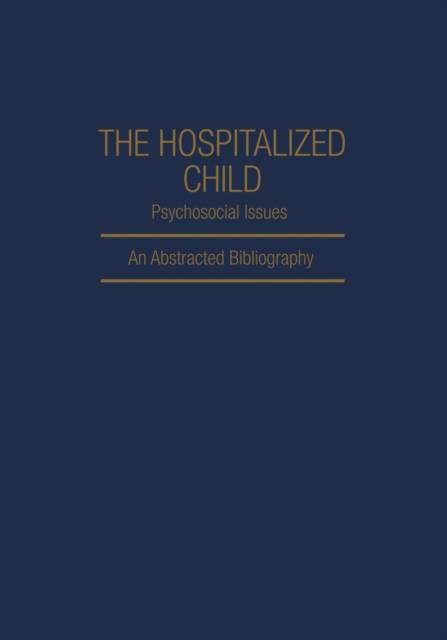
- Afhalen na 1 uur in een winkel met voorraad
- Gratis thuislevering in België vanaf € 30
- Ruim aanbod met 7 miljoen producten
- Afhalen na 1 uur in een winkel met voorraad
- Gratis thuislevering in België vanaf € 30
- Ruim aanbod met 7 miljoen producten
Zoeken
€ 128,95
+ 257 punten
Omschrijving
The Hospitalized Child: Psychosocial Issues is a comprehensive, abstracted bibliography focusing on the behavioral and developmental consequences of short-term, long-term or recurrent hospitalization during childhood and adolescence. The emphasis of this volume is on the psychosocial issues related to the hospital experience/environ- ment, rather than on adaptation to or coping with particular disease states or terminal illness. Publications are included which identify potential problems of hospitalization, coping mechanisms of patients, parents, and staff, and possible solutions. For example, the articles covered in this volume discuss the trauma which may result from the child's separation from mother/family/peers, anxiety over medical pro- cedures, unfamiliarity of the hospital environment, absence from school, restrictions on physical activity, forced dependency and con- cerns over body image. The search for solutions to adaptation diffi- culties often results in the creation of new hospital programs. These too are reviewed in this bibliography. Examples include child-life programs, the care-by-parent units, foster grandparent/surrogate mother programs, and hospital or surgical orientation programs. New therapeutic approaches have been attempted in a hospital setting, in- cluding bibliotherapy, puppet therapy, play therapy and mutual-story- telling techniques. Each of these innovations is represented in the bibliography. Further, hospital redesign schemes are reviewed, in- cluding the feasibility of separate adolescent wards. And finall, modification of hospital policy has been examined, including estab- lishment of liberal visiting privileges, parent rooming-in, day v vi PREFACE surgery, and improved communication between patient, parent, and hos- pitalstaff.
Specificaties
Betrokkenen
- Auteur(s):
- Uitgeverij:
Inhoud
- Aantal bladzijden:
- 294
- Taal:
- Engels
- Reeks:
Eigenschappen
- Productcode (EAN):
- 9781468490985
- Verschijningsdatum:
- 17/11/2012
- Uitvoering:
- Paperback
- Formaat:
- Trade paperback (VS)
- Afmetingen:
- 178 mm x 254 mm
- Gewicht:
- 530 g

Alleen bij Standaard Boekhandel
+ 257 punten op je klantenkaart van Standaard Boekhandel
Beoordelingen
We publiceren alleen reviews die voldoen aan de voorwaarden voor reviews. Bekijk onze voorwaarden voor reviews.











